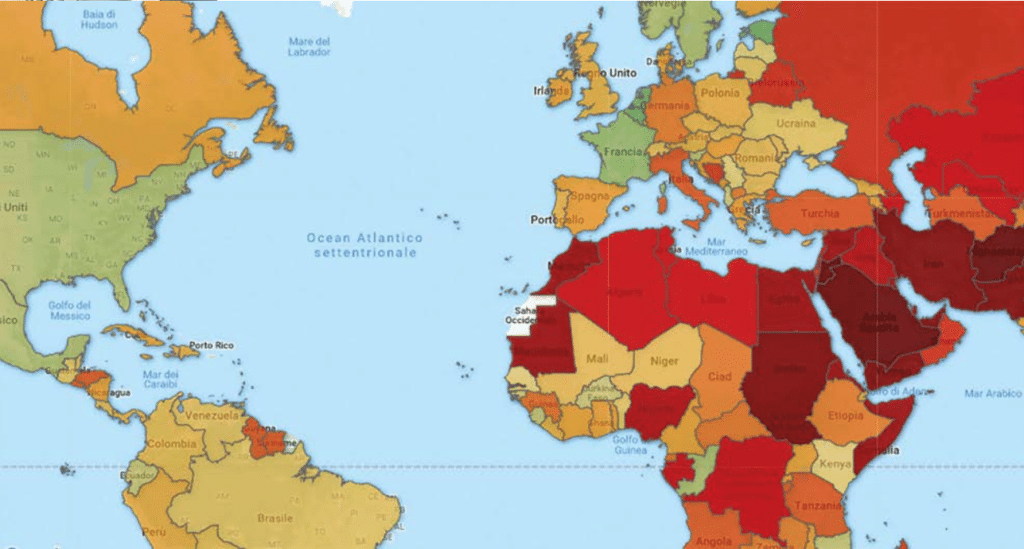Are you a non-religious? Well, Italy doesn’t fit you.
Sure in Italy you are not in danger as you would be in Pakistan, Saudi Arabia or Mauritania, where atheists can be sentenced to death, but actually you can feel a little safer only compared to what you’d feel in Sri Lanka and a few other Countries. And that’s beyond question. Freedom of Thought Report 2018, in fact, ranked Italy only one hundred fifty-ninth out of 196 Countries. We are the lower ranked European country about protection of the rights of the non-believers.
The seventh annual edition of the Report has already been presented at the Chamber of Deputies by the UAAR, The Union of Rationalist Atheist and Agnostics, Unione degli Atei e degli Agnostici Razionalisti, an IHEU Member Organization. Being IHEU, International Humanist and Ethical Union, a not-for-profit organization that defends human rights and promotes Humanist values world-wide, and, moreover, the publisher of the Report.

The ten worst countries to be an atheist, a non-believer or a member of religious minorities are: Saudi Arabia, Iran, Afghanistan, Maldives, Pakistan, United Arab Emirates, Mauritania, Malaysia, Sudan, Brunei Darussalam. The best-performing countries are: Belgium, Netherlands, Taiwan, France, Japan, Nauru, São Tomé and Príncipe, Norway, United States of America, Saint Kitts and Nevis.
IHEU is leading the world in campaigning to promote and protect the rights of atheists and humanists – but frankly – observes Andrew Copson, President of the IHEU – we cannot keep up with the large and powerful lobbies of the Christian-right in America and conservative Islam in the middle-east. At a time of growing nationalism – mr Copson adds – we continue to see those who are brave enough to criticise and critique conservative religious leaders demonized as ‘unpatriotic’ and ‘subversive’.
Italy, as we said, is certainly not a runner-up for the secularity podium. That’s because – as Uaar declares – in spite of the Italian Constitution, discriminations against non-believers (ten million people) are systematic. Why are we in this “enviable” situation? There are many reasons why – continues Uaar – from the teaching of religion in public schools to the eight per thousand unjust system; from the state funding for private religious schools to the continuous presence of representatives of the Roman Catholic Church in tv shows. Moreover, we can’t forget that in Italy criticism of religion is restricted in law (vilipendio) and, from 2006 with a new law (danneggiamento) blasphemy can be punished with a penalty of up to two years in prison.
So in Italy a de facto ‘blasphemy’ law is in effect (art. 724 Penal Code). But it’s a headline only when a christian abroad is accused of this crime and he/she is risking to go to jail (or worst). As in Asia Bibi case happened, when, fortunately, the Pakistani Court revoked the death penalty.
Some of our political leaders could be comical, in their defence of the rights of the believers, if the situation in which they act wasn’t so dramatic. In fact these leaders, defending the believers belonging to their same Faith abroad, cannot stand immigrants and migrant people (that they prefer leaving to the sea and to tortures in Libyan “lager”) also if they belong to the same religion that is dominant in our country. The same religion, by the way, because of blasphemy and vilipendio laws are still in effect in Italy. Broadening the vision, also to spare Italy some shame, we should say that the IHEU Report shows that 71 countries in the world consider blasphemy a crime, 46 countries (mostly Islamic states or countries with majority of Muslim populations) punish it with jail, 7 countries even by death penalty. 18 states consider apostasy a crime, 12 countries punish it by death penalty. So, we need to work really hard if we want a world where atheists and humanists rights are protected.
What we can see reading the IHEU Report is forcing us to consider many things. – says Adele Orioli, general counsel for Uaar – First of all, we should admit that freedom of religion is often difficult or even impossible in some countries of the world. This situation leads often to horrible consequences: discriminations, penalties, jail and death sentences. The silence, often oblivion, about these facts is even worse when outright persecutions involve the un-organised atheists movement in those so called Western countries where freedom of thought and freedom of conscience are said to be constitutional. My second consideration is about us. It was not a surprise that Belgium, France and Netherlands were in the top ten of the best-performing countries, as they actually are (non-religious)paradises for humanists. But it didn’t surprise me neither that Italy was not in that list. In the chromatic ranking that characterised the map, from green to dark red, from free and equal countries to countries where grave violations are perpetrated, Italy gain a dark yellow, in between systemic discrimination and severe discrimination against non-religious. That means that in spite of art. 3, art. 19 and art. 21 of the Italian Constitution we are in danger. Despite secularism has been declared by the Consulta a supreme principle of the Italian law. This Report offers us a double vision for a single purpose: the protection of the human, substantial, insuppressible right to not believe. And to be free to tell it.
Traduzione di Ludovica Valeri






